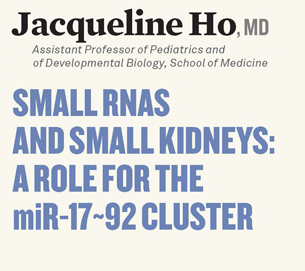
The leading cause of chronic kidney disease and renal failure in children is abnormal development of the kidney and urinary tract. The risk of chronic kidney disease is linked to decreased renal reserve as a result of the formation of fewer and/or abnormal nephrons during kidney development. Furthermore, decreased congenital nephron endowment is associated with adult onset hypertension, a common health problem that leads to decreased life expectancy. Thus, understanding the molecular mechanisms that control nephron number and formation is critical to making an impact on these diseases. Ho and her colleagues have shown that the microRNA cluster miR-17~92 is important in regulating the proliferation of nephron progenitors in the developing kidney, which has important implications for congenital nephron endowment and subsequent kidney health in children and adults.



























